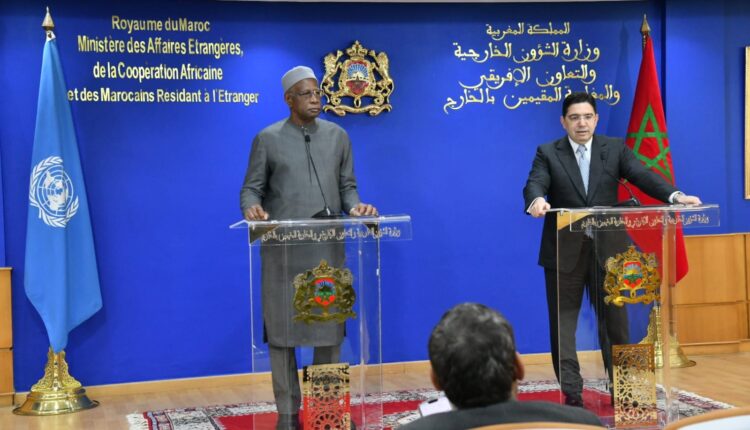Mr. Bourita reaffirms Morocco’s support for the United Nations’ efforts to resolve the Libyan crisis.
Nasser Bourita, the minister of foreign affairs, African cooperation, and Moroccans living abroad, reaffirmed Monday in Rabat that Morocco supports Abdoulaye Bathily, the Special Representative of the UN Secretary General in Libya, in his efforts to find a solution to the Libyan crisis, and emphasized that the kingdom is ready to collaborate with him on a continuing basis as part of carrying out its missions.
“The meeting was an opportunity to discuss the evolution of the situation in Libya, the progress made in some areas, the difficulties still facing the resolution of the Libyan crisis, and also to recall the determinants of the Moroccan position on this issue, represented in four main points, “said Bourita at a joint press conference, after the talks with Mr.Bathily.
@Bathily_UNSMIL : Nous avons eu des échanges très approfondis sur la question de la Libye au cours desquels on a exprimé notre souci commun de contribuer au rétablissement de la paix et de la stabilité en Libye. pic.twitter.com/a0ktKc5dHh
— Maroc Diplomatie 🇲🇦 (@MarocDiplomatie) January 30, 2023
He tried to clarify that these points are represented by Morocco’s support for Libya’s territorial integrity and national unity, as well as for a solution that falls within these parameters. He also emphasized that Morocco is opposed to any attempt to impose military solutions in Libya as part of its support for a peaceful Libyan resolution to the crisis.
The third point, adds Mr. Bourita, is that if there is a solution, it must be Libyan and can only be done with international support, and in this framework comes the primary role of the United Nations to find a solution, noting that the United Nations is the umbrella that can ensure continuity and strength to any Libyan solution that may come after the efforts of the Special Representative of the Secretary General
As for the fourth point, the Minister of Foreign Affairs, African Cooperation and Moroccans Abroad was keen to stress that Morocco separates two issues, namely the question of legitimacy and the question of managing the transition period.
He stated that the only way to resolve the legitimacy issue in Libya is to hold presidential and parliamentary elections, through which the Libyan people will decide who will be granted political management power in their nation, and without which the legitimacy issue will remain unresolved. He expressed his regret that there are some obstacles to the preparation of these elections and his wish to overcome them with the help of Libyans’ wisdom and the international community.
Regarding the issue of managing the transition period, Mr. Bourita added that the management of this stage must be consensual, through institutions that will work on the preparation of elections, executive and legislative power. Bourita added also that the management of this stage must be consensual, through institutions that will work on the preparation of elections, the executive and legislative, stressing that Morocco has always treated these institutions in this perspective, meaning that they are institutions to manage the transition period, whether the current government of national unity, the House of Representatives or the Supreme Council of State, to deliver Libya to elections through which the issue of legitimacy will be resolved.
According to Mr. Bourita, Morocco has acted from the beginning, on the instructions of His Majesty King Mohammed VI, to help Libya and Libyans to meet, discuss and negotiate to find a Libyan solution to the Libyan crisis, and Morocco has always held meetings with the United Nations, from poznika to the recent meetings held in Rabat, all with one direction is that Libyans find a solution to their crisis away from any external interference.
The Minister of Foreign Affairs, African Cooperation and Moroccans Resident Abroad explained that Morocco offers the Libyans a space for dialogue, stressing that the instructions of His Majesty are to remain at the same distance from all Libyans, and that Morocco will not choose between the Libyans or say the legitimacy of one party over the other,” he said.
He concluded that Morocco says that there is a transitional stage and that the issue of legitimacy is resolved through elections, and there are institutions that must be addressed from this point of view, and Morocco continues in these efforts with the United Nations to achieve this solution.


